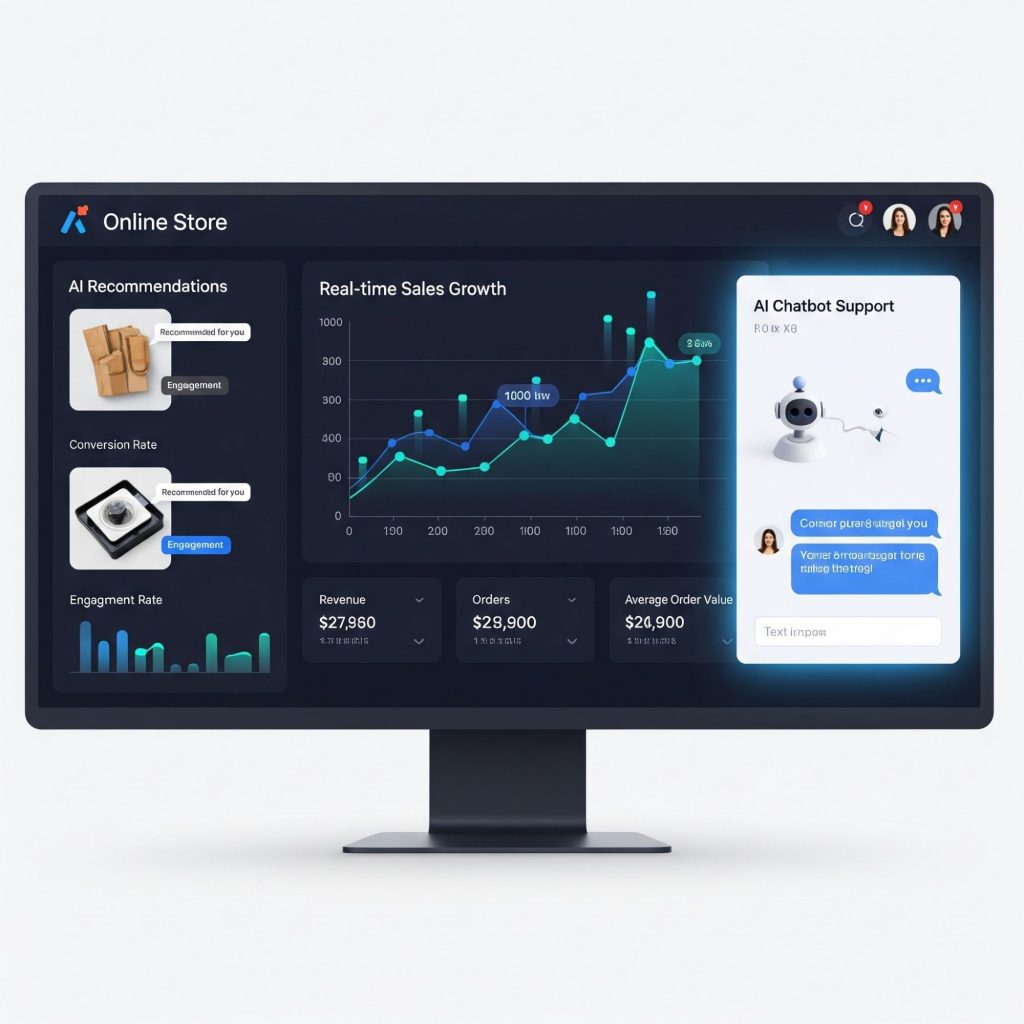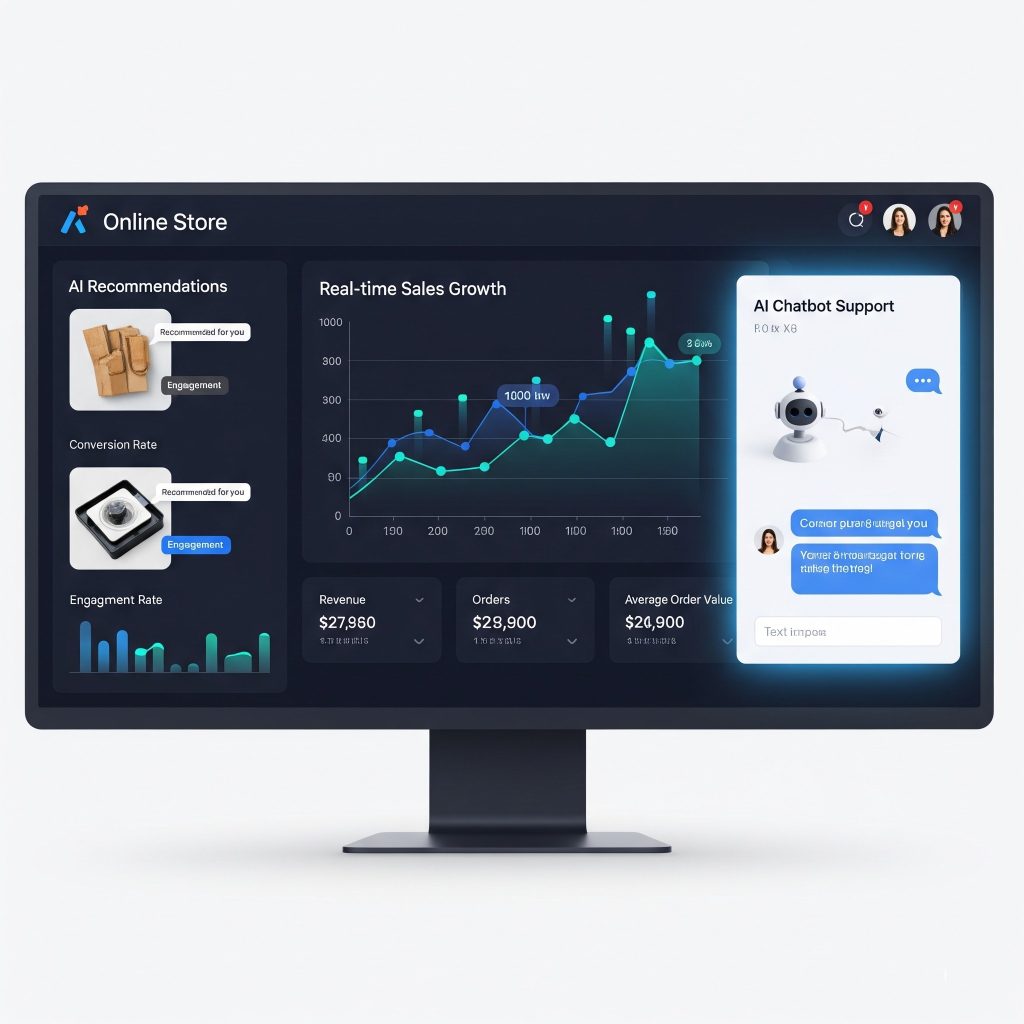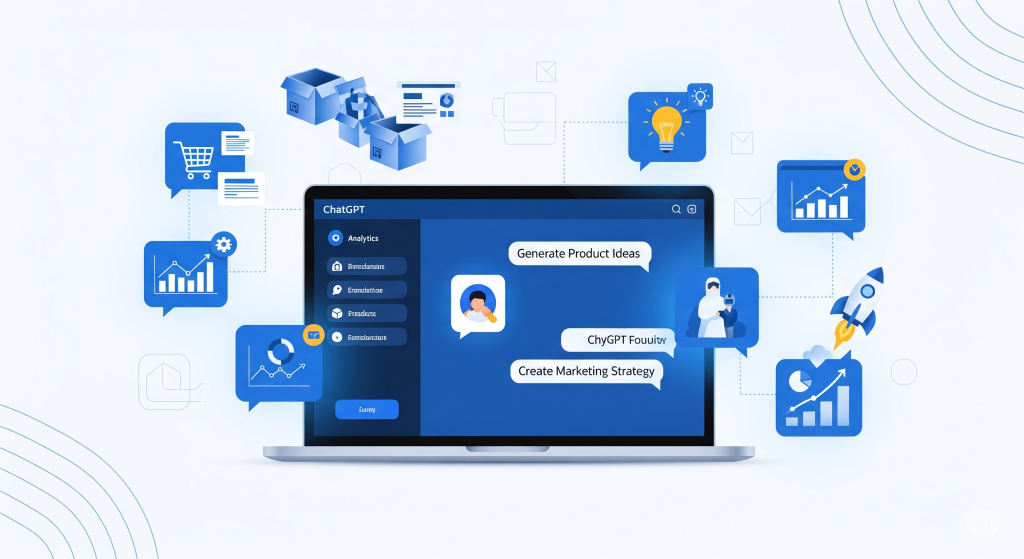Discover top AI tools that can boost conversions and increase sales in your online store in 2025.

AI Tools That Help You Increase Sales in Your Online Store
Boost conversions, optimize marketing, and maximize profits with AI-powered strategies and tools in 2025.
Introduction: Why AI is the Future of Online Store Growth
Running an online store in 2025 is no small challenge. With platforms like Shopify, Amazon, and WooCommerce hosting millions of active sellers, competition is fierce. Customers today expect not only high-quality products but also a seamless shopping experience, personalized recommendations, and instant support. Meeting these expectations manually is almost impossible—but this is where Artificial Intelligence (AI) becomes a game-changer.
AI tools are now the backbone of successful eCommerce strategies. They empower businesses to:
- Write compelling product descriptions that rank in search engines.
- Design attention-grabbing visuals without hiring expensive designers.
- Run targeted ad campaigns that reach the right audience.
- Offer 24/7 customer support via chatbots.
- Optimize pricing and maximize profit margins automatically.
In this massive guide, we’ll explore how AI can help increase sales in your online store with real case studies, monetization strategies, and pricing breakdowns. Whether you are a small startup or a large eCommerce brand, AI can help you compete and win in today’s digital-first marketplace.
Why AI is Essential for eCommerce in 2025
Let’s break down the main benefits AI brings to online store owners:
1. Personalization
AI analyzes browsing history, purchase data, and behavior patterns to recommend the right product to the right customer at the right time. According to McKinsey, personalization can drive up to a 40% revenue increase for eCommerce brands.
2. Automation
From automated product descriptions to predictive stock management, AI saves time and eliminates human error—helping stores scale faster.
3. Conversion Optimization
AI constantly A/B tests copy, product images, and pricing to determine which variations convert best, ensuring stores maximize revenue potential.
4. Predictive Analytics
AI forecasts customer demand, trending products, and seasonal shopping behaviors, giving store owners an edge in planning campaigns.
Top AI Tools That Help Boost Sales
Now let’s dive deep into specific AI tools and categories that can supercharge your online sales.
1. AI for Product Descriptions & Copywriting
Copywriting can be one of the most time-consuming tasks for eCommerce stores. AI-powered writing assistants like Jasper, Writesonic, and Copy.ai generate persuasive product descriptions, ad copy, and SEO-friendly content in seconds.
Example: A Shopify store selling eco-friendly home products used Jasper to rewrite 500+ product listings. Within 60 days, their organic search traffic increased by 37%, and sales grew by 22%.
Related: How to Use AI to Generate Clickable Headlines That Sell
2. AI for Graphic Design & Branding
Visual appeal drives trust and conversions. With AI-powered design tools like Canva AI, Designs.ai, and MidJourney, store owners can create professional logos, product images, banners, and ad creatives in minutes.
Instead of spending $500+ on designers for every campaign, AI design tools cut costs by up to 90% while producing high-quality assets.
Related: Start an AI-Generated Graphic Design Service from Home
3. AI for Content Editing & SEO Optimization
AI doesn’t just generate content—it improves it. Tools like Grammarly, Hemingway, and Surfer SEO ensure product descriptions are clear, engaging, and SEO-optimized to rank higher in search engines.
Related: Earn Money Fast by Offering Content Editing Services
4. AI for Multi-Platform Content Repurposing
Marketing content must be repurposed across multiple platforms—blogs, YouTube, TikTok, Instagram, and more. AI tools like Repurpose.io and Pictory transform a single video or blog into multiple social-ready formats.
Related: Make Money Repurposing AI Content for Multiple Platforms
5. AI for Dynamic Pricing
AI-powered pricing engines analyze competitor prices, demand, and trends to suggest the most profitable price point. Tools like Prisync and Dynamic Yield help maximize margins without losing sales volume.
6. AI for Personalized Recommendations
Recommendation engines like Nosto and Clerk.io drive higher average order values by suggesting relevant upsells and cross-sells based on browsing history.
7. AI Chatbots for Customer Support
Chatbots like Tidio and Intercom AI offer instant 24/7 support, reducing cart abandonment and answering FAQs. They also recommend products during the conversation, increasing conversions.
Case Studies: How AI Increased Sales
Case Study 1: Fashion Store Boosts AOV by 30%
A Shopify fashion retailer integrated AI-driven product recommendations. Customers began receiving curated outfit suggestions. Within 3 months:
- Average Order Value (AOV) grew by 30%
- Email click-through rates jumped by 55%
- Monthly revenue increased by 40%
Case Study 2: Amazon Seller Automates Pricing
An Amazon FBA seller used AI-powered pricing software to adjust prices dynamically. The result:
- Profit margins improved by 25%
- Buy Box wins increased by 18%
- Revenue grew by 28%
Case Study 3: Home Decor Store Uses AI Ads
A home decor Shopify store applied AI-driven ad targeting. Facebook Ads and Google Shopping campaigns were optimized automatically, resulting in:
- Ad spend reduced by 22%
- Conversion rate increased by 19%
- Overall ROAS (Return on Ad Spend) improved by 41%
Monetization & ROI Breakdown of AI Tools
| AI Tool | Use Case | Revenue Impact | Monthly Cost | ROI Potential |
|---|---|---|---|---|
| AI Copywriting | Product descriptions, ad copy | +15–25% sales | $49–$99 | 10x ROI |
| AI Graphic Design | Banners, ads, logos | +10–20% conversions | $10–$50 | 15x ROI |
| AI SEO Tools | Content optimization | +20–30% organic traffic | $30–$79 | 12x ROI |
| AI Pricing Engines | Dynamic product pricing | +20–35% margins | $99–$299 | 8x ROI |
| AI Chatbots | Customer support | +15–25% retention | $19–$99 | 12x ROI |
🚀 Pro Tip: Combine AI copywriting + AI chatbots + AI pricing tools for explosive sales growth in your store.
Pricing Models of AI Tools
AI tools come with various pricing tiers:
- Freemium: Limited usage but great for beginners (e.g., Canva AI free tier).
- Pay-as-you-go: Charged per credit (e.g., MidJourney image generations).
- Monthly Subscription: Most common model, ranging from $20–$200 per tool.
- Enterprise Plans: Custom pricing for large-scale eCommerce stores.
Steps to Implement AI in Your Store
- Audit your current sales process to identify weak points.
- Choose the AI tool category most relevant (copywriting, pricing, chatbots, etc.).
- Start with free or trial plans before scaling up.
- Track KPIs (CTR, conversion rates, AOV, repeat customers).
- Gradually expand your AI stack as revenue grows.
Future of AI in Online Shopping
In the near future, AI will take personalization and automation even further. Imagine AI shopping assistants recommending full wardrobes, or AI predicting your reorders before you even realize you need them. Virtual try-on AR combined with AI-driven size recommendations will eliminate returns. These advancements mean adopting AI today isn’t just about increasing sales—it’s about staying competitive tomorrow.
Conclusion
AI tools are no longer optional—they are a necessity for eCommerce success in 2025. By leveraging AI for product descriptions, design, pricing, personalization, and support, you can significantly boost sales, reduce costs, and increase profits. The earlier you implement AI, the bigger your competitive edge will be.
“AI won’t replace store owners, but store owners using AI will replace those who don’t.”



